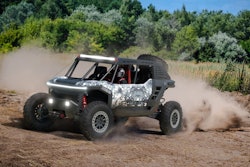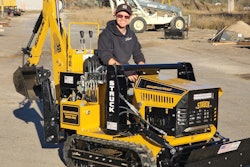For Tom Brinley, having a successful grading company with a stellar reputation isn’t enough. Although “Big Tom” – as he’s known around Raleigh-Durham, North Carolina – is one of the busiest contractors in the area, he’s rapidly assimilating ideas from his three sons on untapped markets to pursue, new areas to serve and how best to take Brinley’s Grading Service into the future. Looking to boost the company’s impressive customer service to the next level, the Brinleys have set their sights on commercial and land development, specialty landscaping and irrigation and infrastructure installation as ways to make Brinley’s Grading a one-stop shop.
Even facing a downturn in the local housing market, Brinley’s grades about 2,000 lots per year. In fact, Brinley’s business is so brisk the company opened a satellite office in the Durham-Chapel Hill area and is considering an office in Pinehurst, 70 miles south of Raleigh. This year, Brinley’s Grading regularly posts the highest weekly totals in the company’s history. The company stays busy by keeping repeat customers happy – longtime client Centex Homes has named Brinley’s Grading their local contractor of the year numerous times.
The bustling pace is satisfying for a man who has construction in his blood. Tom’s father, a supervisor for Ruby Construction in Louisville, Kentucky, for 30 years, raised him on jobsites. “Back then, the rules were more lax – I could go on the job with my dad and sleep on a grader next to the operator,” Tom says. After spending his childhood on construction equipment, it seemed certain Tom would follow in his father’s footsteps. He got married, started a family and tried college, but inevitably ended up at Ruby Construction. He eventually tired of being known only as “Bob Brinley’s son,” however.
Laying the groundwork for success
Striking out on his own, Tom took a job with another Louisville contractor, Roy Powell. Although Tom knew Powell was grooming him to assume control, he found his management style unusual. “He called everyone ‘honey’ and was as tight as a tick,” Tom says.
“He would tell me, ‘Now, honey, we don’t make a lot of money but we have a good time.’ I told him, ‘Honey, I’ve got a wife and kids – I’ve got to make money!’ I almost left a couple of times.” He stayed though, and when Powell retired three years later, Tom borrowed $40,000 to buy his tractor and loader, and took over Powell’s contracts. One of the first was Ryland Homes, which eventually made up about 90 percent of Brinley’s workload. Tom worked long hours and Marian drove the truck to pick up fuel three days a week. But then the 1981 recession hit. “The bottom just fell out,” Tom says. “Since Louisville was hit so hard, Ryland moved to Raleigh, North Carolina, then asked me to follow.”
Tom and his wife Marian have always had a sense of adventure. Even with three small boys, Marian was up for the challenge. In December 1981, Tom made the 600-mile trip from Louisville to Raleigh with a ’72 model loader, a trailer and dump truck. Marian followed with sons Tom Jr., Robby and Chad three months later.
Right away, Brinley’s Grading Service picked up grading, land clearing, utility and curb and gutter work in the growing Raleigh-Durham market. “We started working for Anderson Homes, and bought an old dozer and hired a laborer,” Tom recalls. Raleigh was just getting busy and we were blessed to have good help.” The company eventually took on larger jobs, clearing 20 lots at a time for Centex Homes. In time, the Brinley’s sons began working for their father, eventually rising to become vice presidents of the company.
The art of forming relationships
Tom says their workforce helped establish the company in Raleigh-Durham. They quickly realized the value of attracting and retaining superior employees and worked to provide benefits, including vacation, retirement and promotional opportunities. The company doesn’t just tell employees they are appreciated – Brinley’s pays some of the highest construction wages in the area, Chad says. “Our employees can make great money,” he says. “We have guys with us whose families couldn’t afford to send them to college making more than some people I know with degrees.” Brinley’s Grading also began promoting operators as managers. Tom says having good managers helps control turnover – somewhat. “We do find ourselves serving as a training center,” he says. “But I can’t begrudge a guy for wanting to go into business for himself.”
The company has 115 employees and six managers, many of whom are long-term. Service manager Jeff Jones, who works from Brinley’s 90-by-100-foot shop, is a 14-year company veteran. L.J. Spruill, who started with the company as an equipment operator in 1992 is now an area manager in the Durham office, supervising 26 employees. Kevin Jackson, who also started in 1992, supervises 35 employees at the Garner office. Bill Bower, who has worked in many key positions and now trains new operators, has been employed with Brinley’s Grading since 1989.
Robby says the company aggressively pursues employees with the right attitude. “It’s good to hire someone with the right work ethic even if they don’t have the experience,” he says, and credits Brinley’s managers for knowing what traits to look for. “Jeff is unbelievable. He took an operator who didn’t know anything about turning a wrench, and now he’s an excellent mechanic.”
The way Brinley’s Grading treats their employees has not gone unnoticed. “Brinley’s is a family business and they run it with families in mind,” says Jamie Hale, rental sales manager for Gregory Poole Equipment’s Cat Rental Store, the company’s Caterpillar dealer.
Tom not only tries to attract great employees to Brinley’s, he’s committed to bringing new blood into the area’s construction industry. He’s approached school systems in adjacent Lee County about forming a vocational school to get young people interested in the business – a project in the early stages he and controller Sue Urdahl have been quietly working on. “He likes to stay busy,” Robby says. “I didn’t know anything about the vocational school, and when I asked him, he said ‘If you and your brothers don’t know everything I’m doing, its okay.'”
Transition to the future
Today, Brinley’s Grading runs like a well-oiled machine. Like their father, Tom Jr., Robby and Chad tried college, and then came on board. The company runs more than 70 late model Caterpillar machines including dozers, loaders, excavators, scrapers and skid steers from their 12,000-square-foot facility in Garner. Six full-time mechanics with five service trucks perform preventive maintenance on the equipment. The shop, which took a year to design, features the latest technology. Tom also relies on Cat’s technology. “We service our machines every 200 hours, and use Cat’s oil sampling lab. We take samples of everything. We’d be crazy not to take advantage of it.” Meticulous equipment maintenance has paid off for Brinley’s Grading – the company still runs two 1988 Cat loaders with nearly 30,000 hours on them. “They’re great with maintenance,” says vendor Warren Grant, fleet manager, Capital Ford. “Tom’s got his own shop of people who have been with him for years, and you could almost eat off his shop floor.”
Brinley’s Grading buys new machines and the company’s mechanics keep them running, Tom Jr. says. “We use our dealer for warranty work and our mechanics take care of the rest of the maintenance,” he says. With the exception of hammers, the company rarely rents equipment, preferring instead to have everything on hand. “Most of our light equipment is assigned to an individual operator who takes it with him every day,” Tom Jr. says. “The equipment is stamped with a number and we have a computerized list. Every few months, we inventory the list.” Equipment an operator won’t use every day, such as a water pump, is held in a container at the Garner office and checked out with the project manager as needed.
This system works well in a business always looking to improve efficiency. What translates as a cost-saving measure for the Brinleys becomes a productivity benefit for the client. “If a builder is trying to close a house, we’re not going to be the reason he can’t,” Tom Jr. says.
The drive for efficiency results in weekly meetings during which employees give their input on cost-saving ideas. “The toughest challenge we have right now is the changing market,” Robby says. “We get our guys to work smart and not hard.” Meeting the challenge head-on means developing strategies for the workday, he says. “We tell our operators to think of ways to be more efficient – to plan your day to avoid making multiple trips to the same neighborhood. It’s like a big puzzle and we have to make all the pieces fit.”
Increasing productivity gives the Brinleys the chance to expand. “We have a strong hold on the residential market and want to build on our good customers and grow with them,” Tom Jr. says. “We’re venturing into commercial and land development next, and we’re interested in road building and installing infrastructure.” Chad, who frequently works with landscaping accounts, is pushing for larger jobs. “We want to get the jobs in the $30,000 to $50,000 range and get into irrigation,” he says. “It’s better for the builder with respect to scheduling and warranty issues, and we don’t want to pay another person for something we can do ourselves.”
Tom Jr. also believes the company can excel in specialty landscaping. “It’s a different customer base for irrigation systems and retaining walls,” he says. “In Raleigh-Durham, builders are developing tracts of land everyone avoided because they aren’t so nice. We can figure out a way to make them work.”
Unfortunately, as the company grows rapidly, Tom is forced to steadily scale back his role in the day-to-day operation of the business. He has Retinitis Pigmentosa, a genetic eye disease that affects 1 in 4,000 Americans. The disease causes the retinal rod cells, which control peripheral and night vision, to degenerate slowly over time. Diagnosed thirteen years ago, Tom’s field of vision has now diminished that he can no longer drive or operate equipment, even though he is not blind. For a fiercely independent person, Tom is remarkably philosophical about his condition. “It could be worse – I go up to Duke Medical Center for treatment and see those kids with canes,” he says. “I just have to learn to relinquish some authority; to delegate and let others carry the load.”
As Tom’s condition worsened, his sons assumed greater responsibility. Their division of labor works well, as each son brings a different skill to the business. Tom Jr. oversees the mass grading and light commercial operations, Robby works with the numbers and is vice president of the residential division and Chad oversees the satellite operation and serves as vice president of field operations and customer service. Each gravitated toward the business discipline that attracted them the most. “Tommy hates the office – he’s our problem solver who likes the field and takes on difficult tasks,” Tom says. “Robby is the office man. He’s good with customers, does bidding work and works with Sue, our controller. Chad has really stepped out there and taken on large residential accounts, he does public relations work and meets with customers in the field.”
Tom still handles several vital company functions, such as equipment purchases, though. Also, with decades of construction experience, he has a wealth of information and good advice available for his sons and staff. “I used to be a bit of a hothead,” he says. “But I found out the customer is always right, even if I don’t agree with him. What have you won if you prove to him he’s wrong? Give him a better idea, but convince him it’s his idea.”
Tom says if he has any regrets over the years, its losing valuable time with his family. “Marian has been my right arm. She raised the children and I was the enforcer,” he says. “But I don’t know if I could have changed that and still have the company where it is today.” Now, he tries to impress upon his sons the value of paying attention to their employees. “Listen to the men who work for you – anyone can add something to the equation,” Tom says.
Tom’s sons take the leadership lessons he has given them and apply their own experiences. “The construction business has changed over time – so much is computerized,” Robby says. “But I try to take in everything Dad’s done because he’s so successful.” Tom Jr. learned to leave things better than you found them. “He said to leave it like it’s yours and whoever you work for will be happy,” he says. Chad discovered the importance of reputation. “He’s so well-respected and he’s built this amazing company – he’s my idol.”
Gifts from the heart
The Brinleys quickly embraced their adopted hometown, and regularly donate time, equipment and money to charitable causes. For example, the company works on about 20 local Habitat for Humanity lots each year. Brinley’s Grading employees donate to the Make a Wish Foundation and the Ronald McDonald House, as well. Instead of buying Tom and Marian Christmas gifts, the employees also set up a system of payroll deduction for charitable contributions, and Tom and Marian match what they raise each year. In the past couple of years, the donations have provided for needy families at Christmas, mentored a family whose house burned down, sent a sick child’s family to Disney World and purchased a golf cart for a 17-year-old cardiac patient to use at her family farm.
The Brinley family doesn’t just donate money, though. They get involved in whatever capacity they are needed. The Brinleys even turned their hobby – raising horses – into a way to give back. Tom purchased a 195-acre ranch in nearby Sanford and spent two years clearing the land and burning brush so the family could raise, sell and show horses. “If you’ve got more money than you need, buy a horse,” Tom says with a smile. “That’s all those little hay burners do is eat your money.” The Brinley family then discovered their ranch is adjacent to Oak Ranch, a facility for at-risk boys. Gregory Poole Equipment provided the machines and Brinley’s Grading provided additional equipment and operators to clear and grade a portion of the Oak Ranch property. Once the land was ready, the Brinley family gave Oak Ranch six horses to start an equine program, then Tom Jr. and Brinley’s Grading employees taught the boys to rope. Tom says he is pleased with the result. “It’s neat to be able to do something for someone who needs it,” he says.
Tom is also pleased with his company’s achievements and the slow but deliberate transition from his leadership to that of his sons. “I tell everyone don’t worry about how fast you are, but how well you do things, and you’ll get there,” he says. “Thirty years ago my dream was just to own a tractor and be my own boss.”
What others say
“They treat us with great respect and are absolutely honest. They always follow through.” – Matt Jarrell, owner, Jarco Supply
“The whole baseline in the way they’ve run their business has earned them one of the best reputations in the Raleigh-Durham area. It’s so easy to do business with them it makes you want to do more.” – Jamie Hale, rental sales manager, Gregory Poole Equipment’s Cat Rental Store
“I know where he started and where he came from, and he has blossomed into a great business. I think the world of Tom Brinley.” – Warren Grant, fleet manager, Capital Ford
“They have won our contractor of the year award multiple times. They are fair to their employees and out to get the job done.” – William Sutphin, product manager, Centex Homes






